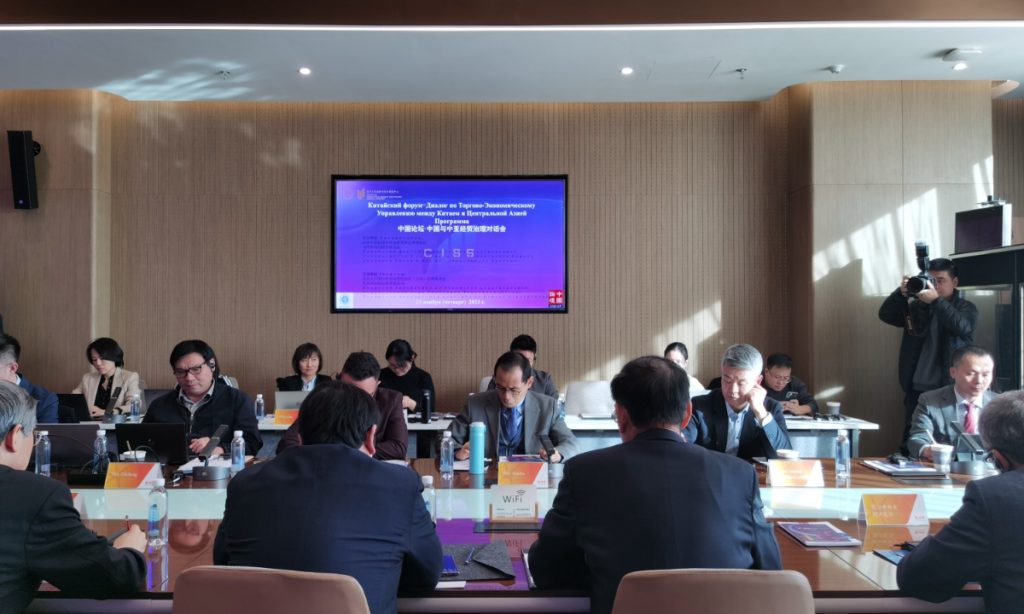Central Asian experts consider China a trustworthy strategic partner, expecting deeper cooperation

Experts from Central Asian countries emphasized the importance of prioritizing the strategic partnership with China at a meeting held in Beijing on Thursday.
The expansion of cross-border transport corridors can bring enormous opportunities and contribute to the economic recovery of countries in the region, they said at the China-Central Asia Economic and Trade Governance Dialogue.
The dialogue attracted more than 10 experts and scholars from China and Central Asian countries, who jointly explored how regional economic and trade cooperation under the framework of the Belt and Road Initiative (BRI) could move toward more sustainable development.
Afzal Askarovich Artikov, chief researcher at the Center for Economic Research and Reform under the Administration of the President of Uzbekistan, stated that the countries in Central Asia are China's tested partners and are willing to engage in sustainable dialogue with China, which is also in the interests of the people of the region.
"We should establish a closer China-Central Asia community with a shared destiny, ensure the security of transportation corridors and important strategic passages, establish long-term economic and trade cooperation plans, and enhance exchanges between think tanks," he said.
It is necessary to promote regional cooperation mechanisms, and there is also widespread anticipation for new economic dialogue platforms, he noted, adding that it is entirely possible for China-Central Asia trade volume to double by the end of 2030.
Artikov specifically mentioned the anticipation for the early completion of the China-Kyrgyzstan-Uzbekistan railway.
In September 2022, China, Kyrgyzstan and Uzbekistan signed a memorandum of understanding on cooperation on the Kyrgyz section of the China-Kyrgyzstan-Uzbekistan railway, making significant headway in the construction of a transport corridor in the Eurasian continent, the Xinhua News Agency reported.
Meanwhile, the China-Europe freight trains through Central Asia, the China-Kazakhstan Horgos International Frontier Cooperation Center, and the China-Kazakhstan International Logistics Base in the eastern Chinese port of Lianyungang have all helped open the door to global markets for Central Asian countries.
The projects have not only promoted commercial activities among the six countries, but also brought people living in the region closer through cultural and people-to-people exchanges.
Zhang Jianping, senior researcher ofthe Chinese Academy of International Trade and Economic Cooperation, stated that China's free trade pilot zones, such as the Xinjiang Pilot Free Trade Zone and the China-Kazakhstan Horgos International Frontier Cooperation Center, should be utilized to leverage the effects of capacity, capital, and talent aggregation.
Over the past 10 years since the proposal of the BRI, the Horgos Port has been integrated into the core area of the Silk Road Economic Belt, continuously enhancing its level of openness, and expanding economic and trade cooperation with countries and regions along the BRI.
As the first cross-border economic and trade cooperation zone established by China with other countries, the China-Kazakhstan Horgos International Frontier Cooperation Center has attracted nearly 30 key projects in areas such as star-rated hotels, catering and entertainment, commercial facilities, and financial services, with over 3,500 registered merchants. It has become an important platform for economic and trade exchanges and cultural exchanges between China and Kazakhstan.
Kazakhstan and China officially implemented a visa-free policy on October 10, and the flow of people at the center continues to rise.
Zhang also emphasized that the potential for economic and trade cooperation between China and Central Asian countries has not been fully tapped. The five Central Asian countries and China can effectively improve the business environment and enhance the level of free trade by promoting and integrating with each other under the BRI framework
Yersultan Zhanseitov, head of the Chinese and Asian Studies Program at the Institute of World Economics and Politics, Kazakhstan, said he values the trans-Caspian international transportation corridor and the visa-free policy between China and Kazakhstan. Kazakhstan has not seen the same level of development speed and scale with any other country as it has with China, he noted.
According to an official announcement made in October at the third Belt and Road Forum for International Cooperation, China will participate in the construction of the trans-Caspian international transportation corridor, and collaborate on a new logistics corridor across the Eurasian continent linked by direct railway and road transportation.
Zhanseitov said he expects reinvigoration of the China-Kazakhstan Horgos International Frontier Cooperation Center following the pandemic, as it is China's gateway to the five Central Asian countries.
Li Jinfeng, executive director of the SCO Research Center and deputy secretary-general of Council on China Russia Strategic Partnership of Coordination at Chinese Academy of Social Science, stated that China's engagement with Central Asian countries is not like that of Western countries as China always hopes to understand the real needs of Central Asian countries and consider what China can offer accordingly. This was also reflected in this year's China-Central Asia Summit in Xi'an.
Central Asia countries were among the first to sign up to the BRI and they have been early beneficiaries of the initiative. This is because the BRI aligns with the development strategies of these five countries, such as Kazakhstan's "Bright Path" new economic policy, National Development Strategyof Tajikistan, and Turkmenistan's Revival of the Silk RoadStrategy, Li said.
The dialogue was hosted by the China Forum, Center for International Security and Strategy at Tsinghua University and the China Center for Contemporary World Studies.